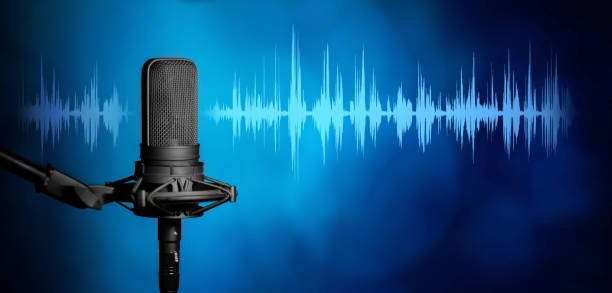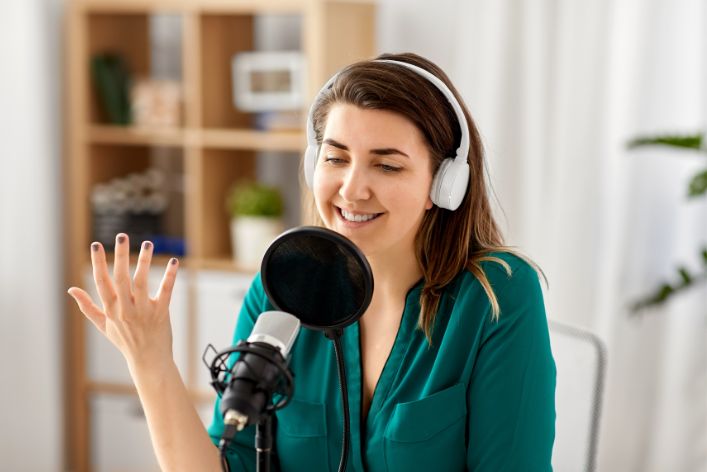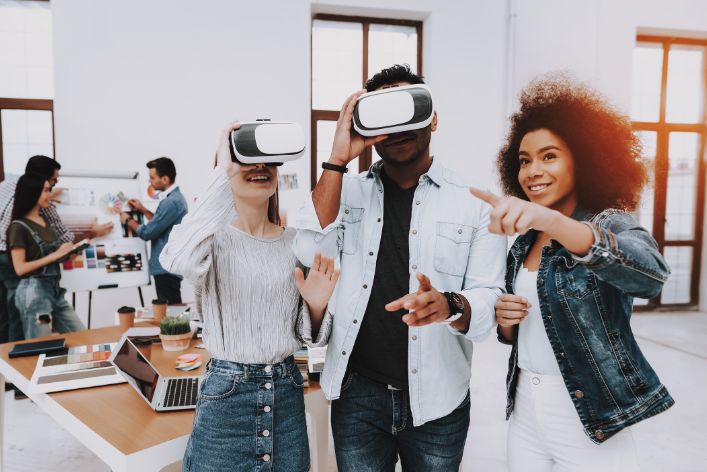Technological progress has transformed radio and the other forms it has inspired, such as podcasts.
While there are some similarities between podcasting and radio, there are also significant differences.
Digital technologies have become the primary choice of individuals in the twenty-first century, whether it’s for entertainment or news.
Podcasts have revolutionized how people consume information, earning the moniker “radio’s reinvention.”
Podcasts and radio both use audio sources to give vital information to their listeners.
Radio is looking for new methods to provide content and access to listeners in a world where hundreds of podcasts are launched every day.
In this blog, we’ll compare podcasts and radio to see if podcasts are genuinely replacing the radio.
What is Podcast?
A podcast is a collection of spoken-word audio episodes about a specific topic or theme, such as cycling or startups.
You may subscribe to the podcast using an app on your phone and listen to episodes on headphones, in the car, or through speakers whenever you choose.
Podcasts may be an excellent method for company owners to build a personal connection with their listeners and potential clients.
They’re hearing you speak to them one-on-one, which humanizes your relationship in a way that written information can’t.
Plus, giving your audience various ways to interact with your content and brand is never bad.
The joy of podcasting is that it requires very little equipment.
Sometimes, they aren’t even edited, with the producers simply inserting their adverts as needed.
It’s incredibly simple to start a podcast, and anyone, any corporation or any organization may do it.
Read: How to Start and Produce a Successful Podcast

What is Radio?
Radio is a classic broadcast medium that has captivated listeners for decades.
Stations create radio programs and broadcast them to listeners via radio towers.
This method allows people to listen to the radio while in their cars or at home.
Amplitude modulation (AM) and frequency modulation (FM) are probably terms you’re already familiar with (FM).
Electromagnetic waves are used in both radio transmission options.
AM may travel further distances than FM.
Regrettably, it is more susceptible to interference.
Although FM does not have this issue, its range can be limited by physical objects such as buildings and mountains.
Most people enjoy radio because it provides them with free music and news.
Radio’s influence can still be seen in the twenty-first century, as it paved the way for wireless communication.
Most radio shows have a format that includes spoken word, music, or a combination of the two.
The division of radio timeslots determines the selection of programming you hear.
Read: The Art of Storytelling: From Books to Podcasts and Beyond
Podcast vs Radio
You may believe that now that you know what a podcast and a radio station are, there can’t be any significant differences between the two.
We’ll look at the differences between podcasts and radio in this part.
Content and Target Audience
When you compare podcasts to radio, content is one of the most significant changes you’ll notice right away.
Because the two of them appeal to distinct audiences, the kinds of content also differ.
Radio stations cater to a wider audience.
To do so, they create material that a more significant number of people can relate to.
Put Your Tech Company on the Map!
Get featured on Nicholas Idoko’s Blog for just $50. Showcase your business, boost credibility, and reach a growing audience eager for tech solutions.
Publish NowMany people will be intrigued for hours if you do it this way.
Podcasts, on the other hand, appeal to a specific demographic.
Podcasts that cover a broad topic are uncommon.
You may easily locate a podcast devoted to cats, dogs, or other pets, for example.
However, finding a radio show with the same topic would be difficult.
Typically, the target audience discovers the podcast they want to listen to by conducting an online search.
As a result, when submitting their content, podcasters must utilize relevant keywords, titles, and tags.
Radio, on the other hand, never does this.
DJs must grab people’s attention with this media type by putting out a wide range of relatable subjects.
Read: Apps for Music Lovers: Top 10 Must-Haves in 2024
Time and access constraints
The first fundamental differences are the scheduling and listening habits of live radio and podcasting.
When it comes to live radio, you have a defined timetable that you must adhere to.
Essentially, you must follow a clock-based regimen such as this:
If your audience tunes in midway through a show, they will have missed the second half.
As a result, as a live radio host, you’ll have to frequently reintroduce yourself, the show, the station, and the topic of discussion.
Your listeners can download or watch the episodes anytime they choose using a podcast.
This allows them to fit their listening into their own schedule.
Recording and schedule
Podcasting isn’t just another kind of radio.
It’s a new type of media with distinct ways of production, presentation, audience participation, and purpose.
The scheduling is a significant distinction between the two.
You must adhere to a predefined schedule of radio programmes.
There is a set schedule for recounting stories, broadcasting news, and broadcasting daily weather updates.
There is no time limit with podcasts because listeners can download and listen to the information whenever they choose.
Podcasters can record and re-record segments as many times as they need.
They can also remove chunks of information if they determine they don’t fit in after listening to them again.
They may eliminate any errors and make everything sound very clean and polished by doing so.
However, they may miss out on the unexpected occurrences that live broadcasts occasionally have, which give the speakers more personality and provide an intriguing and often humorous moment for the listener.
Shelf life
Radio is a more instant medium, meaning that once a radio show gets on the air, it stays on for a time before disappearing into thin air.
You can’t go back and watch another show once it’s finished.
You can’t listen to the same broadcast after it ends as a listener.
Podcasts, on the other hand, do not fall within this category.
In fact, podcasts are constantly available, and anyone can listen to their favourite episodes at any time, even if they are outdated.
Podcasts, unlike radio programmes, have a lengthy shelf life and can be listened to months or years afterwards.
Regulations
If you’ve ever listened to one, you may have noticed that podcasts lack chart-topping music.
Because of the lack of adequate license regulations, a podcaster cannot play your favourite Adele song throughout the show.
Put Your Tech Company on the Map!
Get featured on Nicholas Idoko’s Blog for just $50. Showcase your business, boost credibility, and reach a growing audience eager for tech solutions.
Publish NowOn the other hand, radio stations can easily secure the necessary license to play copyrighted music.
The overall rules and licensing requirements for podcasts vs. radio differ significantly.
A podcaster can still utilize music that has been permitted by the artist or that is in the public domain.
Regrettably, there are limited options.
Radio is a preferable option for folks who wish to listen to music.
However, a podcast is preferable if freedom of speech is more important.

Advertising and engagement
Anyone who has listened to the radio knows how irritating advertisements can be.
Radio is known for its overabundance of commercials and content.
You may hear five minutes of advertisements for every 30 minutes of material.
This is because advertisements are one of the primary sources of revenue for radio stations.
Unlike radio shows, podcasts may thrive with only a few advertisements per episode.
The low ad-to-content ratio is attributable to podcasts’ low production costs.
However, podcasts can still be broadcast even without advertisements.
When it comes to podcast vs. radio engagement, podcasts win hands out.
This advantage arises from the fact that podcast listeners are intensely engaged.
After all, the audience selects the podcasts that they enjoy.
Because radio shows cover a wide range of topics, they cannot engage listeners as effectively as podcasts.
Read: AI-Powered Content Automation: Revolutionize Your Video Marketing
The Bottomline…
While podcasting and radio share many production practices, the two mediums have certain intrinsic differences.
Podcasting isn’t just another kind of radio.
It’s a new type of media with distinct ways of production, presentation, audience participation, and purpose.
Before You Go…
Hey, thank you for reading this blog post to the end. I hope it was helpful. Let me tell you a little bit about Nicholas Idoko Technologies.
We help businesses and companies build an online presence by developing web, mobile, desktop, and blockchain applications.
We also help aspiring software developers and programmers learn the skills they need to have a successful career.
Take your first step to becoming a programming expert by joining our Learn To Code academy today!
Be sure to contact us if you need more information or have any questions! We are readily available.
[E-Books for Sale]
1,500 AI Applications for Next-Level Growth: Unleash the Potential for Wealth and Innovation
$5.38 • 1,500 AI Applications • 228 pages
Are you ready to tap into the power of Artificial Intelligence without the tech jargon and endless guesswork? This definitive e-book unlocks 1,500 real-world AI strategies that can help you.
See All 1,500 AI Applications of this E-Book
750 Lucrative Business Ideas: Your Ultimate Guide to Thriving in the U.S. Market
$49 • 750 Business Ideas • 109 pages
Unlock 750 profitable business ideas to transform your future. Discover the ultimate guide for aspiring entrepreneurs today!
Put Your Tech Company on the Map!
Get featured on Nicholas Idoko’s Blog for just $50. Showcase your business, boost credibility, and reach a growing audience eager for tech solutions.
Publish NowSee All 750 Business Ideas of this E-Book
500 Cutting-Edge Tech Startup Ideas for 2024 & 2025: Innovate, Create, Dominate
$19.99 • 500 Tech Startup Ideas • 62 pages
You will get inspired with 500 innovative tech startup ideas for 2024 and 2025, complete with concise descriptions to help you kickstart your entrepreneurial journey in AI, Blockchain, IoT, Fintech, and AR/VR.
We Design & Develop Websites, Android & iOS Apps
Looking to transform your digital presence? We specialize in creating stunning websites and powerful mobile apps for Android and iOS. Let us bring your vision to life with innovative, tailored solutions!
Get Started Today



